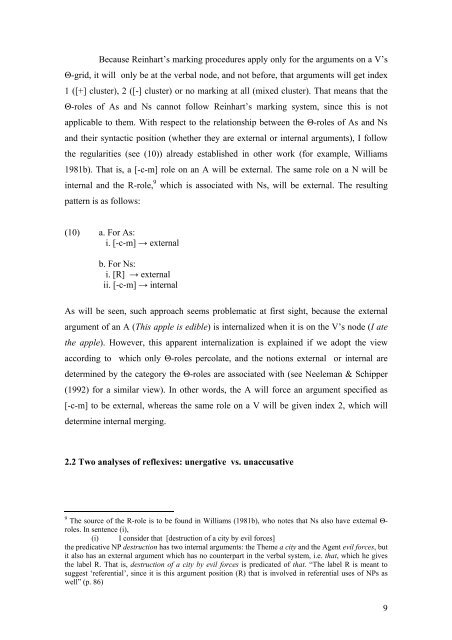Prefixation in English and Catalan - Departament de Filologia ...
Prefixation in English and Catalan - Departament de Filologia ...
Prefixation in English and Catalan - Departament de Filologia ...
Create successful ePaper yourself
Turn your PDF publications into a flip-book with our unique Google optimized e-Paper software.
Because Re<strong>in</strong>hart’s mark<strong>in</strong>g procedures apply only for the arguments on a V’s<br />
Θ-grid, it will only be at the verbal no<strong>de</strong>, <strong>and</strong> not before, that arguments will get <strong>in</strong><strong>de</strong>x<br />
1 ([+] cluster), 2 ([-] cluster) or no mark<strong>in</strong>g at all (mixed cluster). That means that the<br />
Θ-roles of As <strong>and</strong> Ns cannot follow Re<strong>in</strong>hart’s mark<strong>in</strong>g system, s<strong>in</strong>ce this is not<br />
applicable to them. With respect to the relationship between the Θ-roles of As <strong>and</strong> Ns<br />
<strong>and</strong> their syntactic position (whether they are external or <strong>in</strong>ternal arguments), I follow<br />
the regularities (see (10)) already established <strong>in</strong> other work (for example, Williams<br />
1981b). That is, a [-c-m] role on an A will be external. The same role on a N will be<br />
<strong>in</strong>ternal <strong>and</strong> the R-role, 9 which is associated with Ns, will be external. The result<strong>in</strong>g<br />
pattern is as follows:<br />
(10) a. For As:<br />
i. [-c-m] → external<br />
b. For Ns:<br />
i. [R] → external<br />
ii. [-c-m] → <strong>in</strong>ternal<br />
As will be seen, such approach seems problematic at first sight, because the external<br />
argument of an A (This apple is edible) is <strong>in</strong>ternalized when it is on the V’s no<strong>de</strong> (I ate<br />
the apple). However, this apparent <strong>in</strong>ternalization is expla<strong>in</strong>ed if we adopt the view<br />
accord<strong>in</strong>g to which only Θ-roles percolate, <strong>and</strong> the notions external or <strong>in</strong>ternal are<br />
<strong>de</strong>term<strong>in</strong>ed by the category the Θ-roles are associated with (see Neeleman & Schipper<br />
(1992) for a similar view). In other words, the A will force an argument specified as<br />
[-c-m] to be external, whereas the same role on a V will be given <strong>in</strong><strong>de</strong>x 2, which will<br />
<strong>de</strong>term<strong>in</strong>e <strong>in</strong>ternal merg<strong>in</strong>g.<br />
2.2 Two analyses of reflexives: unergative vs. unaccusative<br />
9<br />
The source of the R-role is to be found <strong>in</strong> Williams (1981b), who notes that Ns also have external Θroles.<br />
In sentence (i),<br />
(i) I consi<strong>de</strong>r that [<strong>de</strong>struction of a city by evil forces]<br />
the predicative NP <strong>de</strong>struction has two <strong>in</strong>ternal arguments: the Theme a city <strong>and</strong> the Agent evil forces, but<br />
it also has an external argument which has no counterpart <strong>in</strong> the verbal system, i.e. that, which he gives<br />
the label R. That is, <strong>de</strong>struction of a city by evil forces is predicated of that. “The label R is meant to<br />
suggest ‘referential’, s<strong>in</strong>ce it is this argument position (R) that is <strong>in</strong>volved <strong>in</strong> referential uses of NPs as<br />
well” (p. 86)<br />
9
















